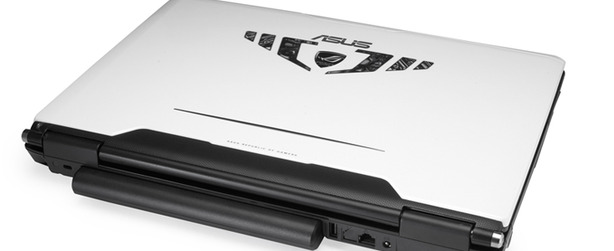
Battery Life & Conclusion
As standard, the G60Vx is supplied with a 6-cell battery. We tested how much power it would provide when gaming by charging it fully, disconnecting from the mains, and then loading Crysis. We then let our hapless character die and auto-reload over and over, recording how long it took for the battery to be depleted.With this test, the G60Vx gave us 48 minutes of battery life, which really is quite poor. As the G60Vx weighs in at just over 3.3kg (plus extra for the power brick), it really isn't the most portable of laptops, and we suspect anyone seriously looking to buy this machine isn't thinking too hard about mobility.

The G60Vx with its standard 6-cell battery fitted
All the sales and market data we've seen shows that people are abandoning desktop machines for laptops, and while it's easy to understand the lure of a PC that's sleek and sexy, the appeal of the gaming laptop is far harder to comprehend. The G60Vx is a great example of the many compromises said machines tend to involve. The most obvious area to criticise is the GPU. It's clear that far from being a behemoth that would go on to crush all before it, the GT200 architecture is becoming a millstone around Nvidia's neck. The company has been unable to shrink it or scale it.
While on the desktop it was able to reduce the prices of supposedly high-end cards such as the GeForce GTX 260 to make them competitive, the power consumption and heat issues of the chip means it's unsuitable for laptops, even fairly bulky ones such as the G60Vx. As a result then, Nvidia is dependant on G92, a design that's close to two years old, and the knock on effect is that Asus has felt the need to pair it with a low resolution screen.
While the low screen resolution suits the GPU, it’s poor for desktop and applications; 1,680 x 1,050 would be a better choice, balancing appeal for 2D usage without incurring too much work for the GPU. Then there's the issue of the Radeon HD 4850 which can keep pace with the GTX 260M and is found in cheaper machines. It's not all the fault of the GPU; the panel itself is disappointingly poor quality, and the chassis is still chunky. Asus has included a nice keyboard, and the core spec - CPU, hard disk, Blu-Ray drive - is fine.

The Republic of Gamers logo on the lid lights up
Conclusion
On paper, and in the tests, the G60Vx acquits itself pretty well. There's not much wrong with a 2.53GHz Core 2 Duo, 4GB RAM and a Blu-Ray drive, after all. Add in the quality keyboard and the not horrific styling and you might think it's a product well on its way to a recommendation. And in some respects, it does get close - after all, it's a gaming laptop which can play a good number of modern games at the native resolution of its panel.The problem is said panel is poor quality, and the resolution is irritatingly low for 2D usage. Add in the fact that Radeon HD 4850 equipped machines are as quick in gaming and tend to be cheaper and we think you'll see why we've concluded the G60Vx is far from perfect for most people.
- Build Quality
- x
- x
- x
- x
- x
- x
- x
- x
- x
- -
- 9/10
- Features
- x
- x
- x
- x
- x
- x
- -
- -
- -
- -
- 6/10
- Ease of Use
- x
- x
- x
- x
- x
- x
- x
- x
- -
- -
- 8/10
- Performance
- x
- x
- x
- x
- x
- x
- x
- -
- -
- -
- 7/10
- Overall
- x
- x
- x
- x
- x
- x
- x
- -
- -
- -
- 7/10

MSI MPG Velox 100R Chassis Review
October 14 2021 | 15:04








Want to comment? Please log in.